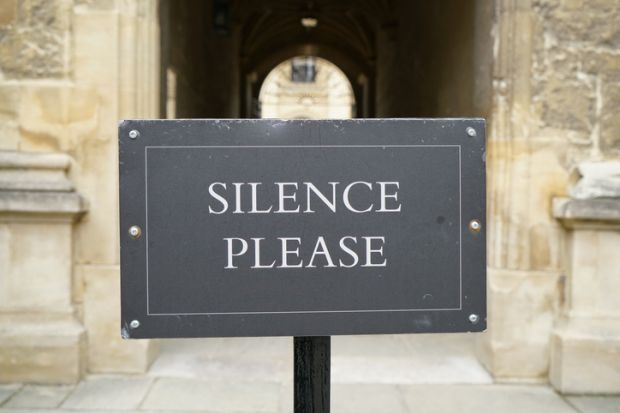“Self-censorship” on issues relating to China in UK institutions increasingly dependent on research links with the emerging superpower is “the most important freedom of speech issue facing universities”, according to former minister Lord Johnson of Marylebone.
The former Conservative universities minister, who resigned from the government led by his brother Boris Johnson in 2019, made the comments at the Times Higher Education UK Academic Salon on 12 May, as ministers prepared to legislate on campus free speech in England.
Critics accuse the government of exaggerating the scale and significance of free speech controversies in universities in order to boost its “culture war” approach to identity issues.
Lord Johnson spoke during a session on the future of UK-China research collaboration, having been a co-author of a report on “managing risks and maximising benefits” in higher education and research partnerships with China published by the Harvard Kennedy School, King’s College London Policy Institute and the Institute for Scientific Information at Clarivate in March.
Asked by THE editor John Gill about the government’s plans for a free speech bill, Lord Johnson replied: “To my mind the most important freedom of speech issue facing universities today relates to self-censorship around China.”
He continued: “It’s so important that universities can contract with China in full confidence that they are doing so using a common framework that’s established by the sector and supported by their own government and also in alliance with other governments around the world, that will enable them to genuinely have freedom of speech and freedom of research in all areas that might touch on China’s interests.”
He added: “That to me is a genuine and real threat to freedom of speech. If the [free speech] bill can perhaps help address that issue too it will serve a very useful purpose.”
Earlier in the session, Lord Johnson criticised a Universities UK report on managing security risks internationalisation for failing to even mention the word “China”.
Research collaborations with China will be “central to the UK’s future as a knowledge economy” and its ability to tackle global challenges – but the huge growth of UK-China research links has gone “unexamined” in public policy, the former minister argued.
Collaborations with China were “increasingly central” to the UK’s “viability” in research fields including automation and control technologies, telecommunications and materials science, he said.
As “the idea that any decoupling with China is in the national interest” was “highly unlikely” to be true, Lord Johnson continued, a “system-wide approach to how to handle research collaboration with China” was needed.
Having “common contractual relationships” for universities working with Chinese entities, developed by Universities UK and UK Research and Innovation in partnership with the government and other “liberal democracies”, could help “build confidence” among policymakers that universities were “upholding the values of the academy in relationships with China”, he said.
Lord Johnson called for a “Domesday Book” of research links with China to give “early warning” of fields where “dependencies” on China are emerging.
And he said that the Office for Students, the English higher education regulator, should monitor universities to ensure they have plans to diversify international recruitment plans and “to mitigate dependencies” on Chinese student flows.
The THE event was held in partnership with Huawei.
Register to continue
Why register?
- Registration is free and only takes a moment
- Once registered, you can read 3 articles a month
- Sign up for our newsletter
Subscribe
Or subscribe for unlimited access to:
- Unlimited access to news, views, insights & reviews
- Digital editions
- Digital access to THE’s university and college rankings analysis
Already registered or a current subscriber?








